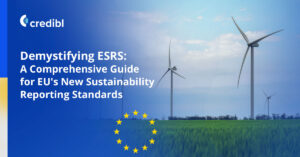It’s been quite a buzz recently in the corporate world with the findings of Fidelity International’s survey. It highlighted that 60% of businesses’ environmental, social, and governance (ESG) claims are not backed up by action—a wake-up call indeed!
Before we dig in, let’s quickly reiterate why this statistic is significant. ESG matters have grown from a trend to a necessity, with investors, stakeholders, and the public paying closer attention to how companies manage these aspects of their operations. So when a company’s ESG claims turn out to be mere lip service, it risks damaging its reputation and losing trust.
But here’s the silver lining – the solution lies in an often underappreciated aspect of ESG management, effective ESG bookkeeping.
The Power of ESG Bookkeeping
ESG bookkeeping, part of the broader field of ESG data management, is about accurately tracking and managing company’s ESG data. Behind every solid ESG claim, there is a backbone of systematic ESG bookkeeping, which truly gives substance to these sustainability assertions.
Now, let’s talk about a game-changer in this field: ESG data management software.
- Scalable Data Collection: ESG data management software effortlessly handles a large variety of data points. It collects, organizes, and interprets data from multiple sources, offering you a scalable solution that grows with your company’s ESG ambitions.
- Consistent and Accurate Reporting: A key feature of a robust ESG software is its ability to generate consistent, accurate reports. It takes the guesswork out of your ESG reporting, ensuring that every bit of data is verifiable and traceable, thereby adding credibility to your ESG claims.
- Real-Time Monitoring: What if you could monitor your ESG performance as it happens? With real-time monitoring capabilities, ESG software allows for immediate action, letting you proactively manage your ESG efforts instead of just reacting.
- Compliance Tracking: Regulatory landscapes are always evolving. ESG software keeps track of this, helping you stay aligned with the latest ESG compliance requirements and ensuring you’re always on top of your regulatory game.
- Strategic Decision-Making: Perhaps one of the most significant benefits of ESG software is the insights. With in-depth data analysis, it informs strategic decision-making, highlighting areas of risk and opportunities for improvement.
ESG bookkeeping, powered by effective data management software, is no longer just a ‘nice-to-have’. It’s now the ‘must-have’ tool for driving ESG initiatives, aligning with regulatory standards, and most importantly, cementing your reputation as a company that not only talks the ESG talk but walks it too.
The Challenges and Opportunities
Challenges
- Vastness of Data: Tracking ESG-related data across different departments and locations can be daunting due to its sheer scale.
- Lack of Standardization: Varied ESG metrics across industries, and the absence of universal standards can make comparative analysis difficult.
- Evolving Regulations: Keeping pace with constantly changing ESG regulations can be complex.
- Skill Gap: ESG bookkeeping requires specific expertise, and a shortage of these skills can pose a challenge.
Opportunities
- Enhanced Transparency: Effective ESG bookkeeping can lead to transparent reporting, building stakeholder trust and enhancing reputation.
- Improved Decision Making: Accurate ESG data can inform strategic decisions, aligning them with ESG goals.
- Risk Mitigation: Identifying potential risks through ESG bookkeeping allows for their timely mitigation.
- Attracting Investment: Robust ESG bookkeeping can appeal to investors increasingly focusing on ESG performance.
The Way Forward
So, what’s the takeaway from all this? It’s simple. ESG bookkeeping is not just an administrative task—it’s a strategic tool that can empower your company to transform its ESG promises into measurable actions.
With Credible, navigate the evolving regulatory landscape and foster informed decision-making along with streamlined data collection and consistent reporting. It acts as a linchpin in your ESG strategy, enabling your organization to translate ambitious sustainability pledges into measurable actions. By embracing robust ESG data management software, businesses can ensure that their ESG bookkeeping is not just a function, but a force – a force that drives credibility, builds trust, and exemplifies their commitment to sustainable business practices.







